
New training in cultural competency for general practice
4 June 2024
Lights, camera, action!
Wallaga Lake’s Umburra Cultural Centre became a film set when COORDINARE - South Eastern NSW Primary Health Network brought a film crew to interview local Aboriginal community members. COORDINARE has been travelling around the region from Wollongong Queanbeyan, Goulburn and now Wallaga Lake, to make a film that educates general practice staff in culturally safe health care.
COORDINARE contracted cultural educator Errolyn Strang to facilitate a discussion with Narooma’s Ron Mason and Lynette Goodwin and Uncle Warren Foster from Wallaga Lake. They yarned about accessing health care, what good health care looks like and the ongoing importance of COVID vaccinations.
COORDINARE Community Engagement Officer Terry Hill said their statistics suggested a large proportion of the region’s Aboriginal population attend a mainstream general practice. “It is about choice, so we are trying to educate and to transform the general practice to be a safe place, not just for Aboriginal people but also other groups like LGBTQI,” the Walbunja man said.
The Royal Australian College of General Practitioners requires that general practices conducting 715 health checks have a certain percentage of staff go through cultural accreditation. The free 715 health checks help to identify risk factors for chronic disease. “We are putting together an online training module on cultural awareness and cultural safety to support mainstream practices become more culturally safe,” Mr Hill said.
COORDINARE Associate Director, Primary Care Development, Kaleena Webbe said Primary Health Networks are tasked with supporting mainstream doctors to provide culturally safe and appropriate care. “We are creating localised cultural competency videos,” Ms Webbe said. “We think it is important for our doctors to see local faces and local places to give that personal connection. Providing this support for mainstream providers as well as engaging with local community members and supporting local Aboriginal business like is also part of our remit under our Reconciliation Action Plan.”
Little changes helping to Close the Gap
Just before the COVID pandemic, COORDINARE ran a pilot program in five medical practices that had relatively high numbers of Aboriginal patients. The practices were in Wollongong, Nowra, Narooma, Goulburn and Queanbeyan. COORDINARE funded them to work with local Aboriginal community members to co-design improvements to their service. In each town a small group of community members discussed what was good, what was bad and what the practice could do to make Aboriginal patients feel safer and more confident about going to see a doctor.
In Goulburn where there is no AMS, one practice erected flag poles so that it could fly the Aboriginal and Torres Strait Island flag. The community identified that transport was a problem. The practice successfully lobbied the Council to have a bus stop outside the practice and included in bus routes.
As a result of the program in Narooma, a popular medical practice has a Walawaani sign to welcome people, a sign that acknowledges country and staff wear shirts with an Aboriginal design. “People feel safe and see something familiar,” Mr Hill said. “By general practice staff – doctors, nurses, receptionists and practice managers – having that understanding of the health and wellbeing of Aboriginal people these are the sorts of things that help us Close the Gap.”
